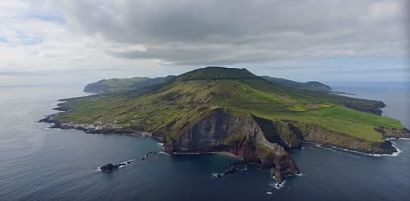
The order for the grid energy solution was placed by Portuguese project company Graciolica Lda and announced in January 2018. It was inaugurated on Graciosa on 20th February 2020. The purpose of the island grid is to reduce diesel fuel consumption and maximise renewable energy for over 4,000 island inhabitants. The use of renewables will be increased from 15 percent to 65 percent with Wärtsilä’s new technology solution.
Energy storage is needed to overcome the intermittency of renewable sources, manage the frequency and quality of the supplied power, and provide backup energy to meet spikes in demand. The power plant includes an energy storage system that enables a more resilient and sustainable power system as critical grid asset.
The entire island’s energy management is monitored, integrated and optimised by Wärtsilä’s GEMS, an advanced energy management software system. GEMS software uses artificial intelligence and machine learning technology to optimise multiple energy generation assets based on load patterns and weather forecasting. GEMS's computing technology and logic also accommodates the island's renewable intermittent sources such as solar and wind. Particularly unique to the project is that GEMS does both individual asset control as well as system balancing to maximise renewable energy penetration, something traditionally carried out by system operators. GEMS has allowed the island system to perform at its best while decreasing the cost of diesel power generation. Wärtsilä will also provide software maintenance services under a five-year agreement.
Island grids present a unique set of challenges, particularly the heavy dependence on liquid fuel imports, coupled with a growing concern for climate change and need for reliable energy to provide critical power needs. Energy storage is a sustainable alternative. Wärtsilä’s island grid solution enables maximum renewable penetration, lowers reliance on imported liquid fuels and significantly reduces greenhouse gas emissions. The Graciosa Hybrid Renewable Power Plant has the potential to eliminate approximately 190,000 litres of diesel fuel per month.
“As a nation of islands, climate change is a matter of urgent priority” said Scott Macaw, Director of energy company HowardScott. “The Graciólica project is one example of the ways in which we are working to mitigate the effects of the environmental crisis. The island grid integrated and optimised by Wärtsilä will provide Graciosa with an environmental benefit as well as many economic benefits to our local communities.”
Risto Paldanius, Director, Business Development, Energy Storage and Optimisation, Wärtsilä, added that the Graciosa project demonstrates the enormous potential of energy storage in maximising renewable generation in power systems and that although about 17 percent of global energy generation currently comes from renewables, as this increases, energy storage becomes a critical asset. Utilities and independent power producers are increasingly turning to energy storage systems to integrate renewable sources into their baseload generation to build more efficient, reliable and environmentally sound hybrid power systems.
For additional information:

